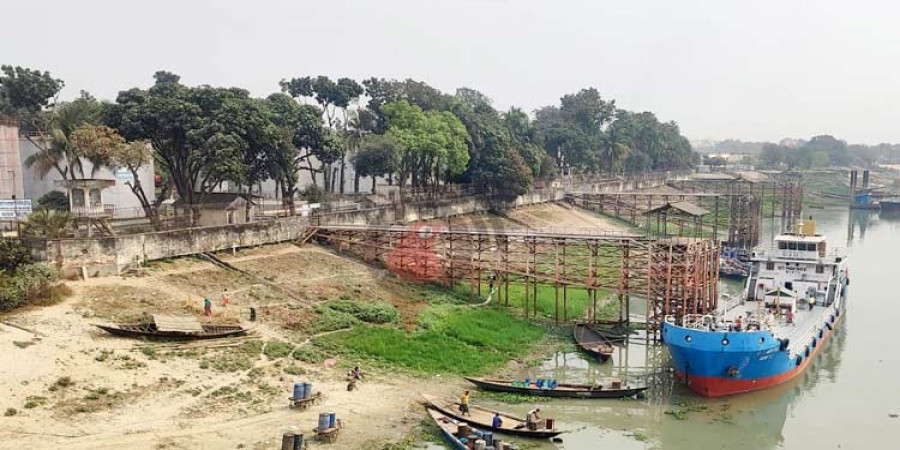
ছবি: Photo: Collected
The Great Oil Heist: How Thousands of Liters of Fuel Are Stolen Daily from Barguna Port, Costing the Government Billions
In the dead of night, the serene waters of the Baral River in Sirajganj transform into a bustling black market for stolen fuel. Every night, thousands of liters of diesel and octane are siphoned off from oil tankers anchored in the river, costing the government hundreds of crores in lost revenue annually. This illegal operation, run by a powerful syndicate involving ship crews, corrupt oil depot officials, and local mafia, continues unabated under the nose of local authorities.
The Nightly Operation: A Well-Oiled Machine
As darkness falls, the Baral River near Baghabari Port becomes a hive of activity. Small boats stealthily approach oil tankers, where workers swiftly transfer fuel through pipelines into drums. These drums are then loaded onto the boats and transported to the black market. The operation is smooth, efficient, and alarmingly routine.
Local sources reveal that the syndicate, led by a man known as "Langra Swapon," includes over 40 members from nearby villages. They work in coordination with ship crews and depot officials, ensuring the stolen fuel is safely transported and sold. The syndicate’s reach extends to local law enforcement, with allegations of collusion between the thieves and police officials.
The Scale of the Theft: A Billion-Taka Industry
On average, 50,000 to 70,000 liters of fuel are stolen daily from ships and tankers. This amounts to 1.5 to 2 million liters per month and a staggering 20 to 25 million liters annually. Sold at a discounted rate of 10-15% below the government price, the illegal trade generates an estimated daily revenue of 2 crore taka, totaling over 700 crore taka per year.
The stolen fuel is primarily used in agriculture and transportation sectors, where demand is high. During peak seasons, such as the Boro rice cultivation period, the theft increases significantly to meet the rising demand for diesel.
The Methods: How the Theft Goes Unnoticed
The syndicate employs several tactics to conceal the theft. One common method is manipulating ship manifests, where the actual amount of fuel unloaded is less than what is recorded. Additionally, gauges and meters are tampered with to show false readings, making it difficult to detect discrepancies. In some cases, water is mixed with the remaining fuel to maintain the appearance of a full tank.
Corrupt depot officials play a crucial role in covering up the theft. By falsifying records or turning a blind eye during inspections, they ensure the illegal operation runs smoothly.
The Authorities: Silent Spectators?
Despite the scale of the operation, local authorities have taken little action over the past two years. When questioned, Shahjadpur Police Station’s acting officer-in-charge, Aslam Ali, denied any knowledge of the illegal activities. Similarly, Baghabari Oil Depot’s responsible officer, SM Sadekin, remained unresponsive to inquiries.
Shahjadpur Upazila Executive Officer Kamruzzaman acknowledged the issue but stated that the local administration has no direct authority to intervene. He emphasized that the responsibility lies with the Bangladesh Petroleum Corporation (BPC), which has not conducted any raids in the area over the past year.
The Bigger Picture: A National Crisis
The Baghabari Port, established in 1983, is a critical hub for supplying fuel and essential goods to northern Bangladesh. However, its vulnerability to theft and corruption highlights a larger issue plaguing the country’s energy sector. With billions of taka lost annually, the government faces not only financial losses but also a growing challenge in curbing the influence of powerful syndicates.
As the illegal trade continues to flourish, the question remains: how long will it take for the authorities to crack down on this billion-taka heist?
Daily Theft: 50,000 to 70,000 liters of fuel stolen.
Annual Loss: Over 700 crore taka in government revenue.
Syndicate: Led by Langra Swapon, involving 40+ members.
Authorities: Alleged collusion with police and depot officials.
Impact: Stolen fuel sold at 10-15% discount, primarily used in agriculture and transport sectors.
The story of Baghabari’s oil heist is a stark reminder of the challenges Bangladesh faces in combating corruption and organized crime. Without decisive action, the shadowy world of illegal fuel trade will continue to thrive, draining the nation’s resources and fueling a cycle of crime and impunity.
repoter






